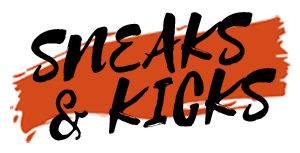As part of taking steps further towards making the company more environmentally friendly, Levi’s has partnered up with The Woolmark Company to create its first eco-conscious, utilitarian style boot, the Torsten Quilted.
Levi’s and its parent company Levi Strauss and Co. have been working on improving the material, sourcing, and manufacturing of its jeans and products for the past several years, aiming to source 100% of its cotton sustainably and to run all of its own and operated facilities on renewable energy by 2025. Levi’s commitment to sustainability aligns well with Woolmark, who has a strong focus on traceability and the reduction of the environmental impact of its wool.
While the entire silhouette of the Torsten Quilted is made of renewable materials, such as the upper made of Leather Working Group certified nubuck leather and eco-Cordura, and the midsole and lacing made from 20 percent recycled materials, the main feature of the boot is undoubtedly the Woolmark-certified lining.
For the boot’s inner lining, Woolmark and Levi’s selected Australian Merino wool, a fully renewable, biodegradable, and recyclable natural fiber that promises comfort, durability and high performance while utilizing the natural properties of the wool such as breathability, moisture management, and odor resistance.
We caught up with Francesco Magri, Regional Manager Europe, Central&Eastern at The Woolmark Company, to understand the processes behind its production, the collaboration with Levi’s, and other recent projects.
Can you give us a quick run-down of how Woolmark operates when it comes to working with companies such as Levi’s for the development of a product?
Woolmark’s support to our partners is 360 degrees. We help them in research and development both in terms of know-how and investments aimed at innovation. We help find the right fabrics and yarns, identify suppliers who implement sustainable processes, and educate its staff —from the product department to sales— on the benefits and quality of wool.
In addition to Levi’s and many other brands, Woolmark also recently partnered with Victoria Beckham. Tell us more about what made that collection special?
The Woolmark Company and Victoria Beckham have a beautiful, long-standing relationship. Victoria has been a great supporter of the International Woolmark Prize, and both The Woolmark Company and VICTORIA BECKHAM share common values regarding sustainable practices and working towards a better tomorrow for the fashion and textiles industries. This partnership was further enhanced by Victoria Beckham wishing to create a luxurious knitwear collection – and so Merino wool was the natural choice.
Right from the start, it was evident that VICTORIA BECKHAM wanted to create its most eco-friendly collection to date, with timeless, long-lasting pieces. We were able to select non-mulesed wool from just five Australian wool-growing properties to be used in the collection, allowing it to be traced back to farm level. Through our Woolmark Company connections, we are able to continue the traceable journey throughout the supply chain, choosing natural dye specialists and Woolmark licensee Tintoria di Quaregna to further enhance the eco-credentials of the collection. The collection achieved the desired, vibrant color palette through a unique plant-based natural dyeing process using dyes made from flowers, leaves, and berries.
How do you ensure sustainability, which you consider one of Woolmark’s key cornerstones in the projects and collaborations you develop? ?
Wool is a 100% natural, biodegradable and circular fiber: it is sustainable by nature! Full sustainability plays a role in the downstream processes. For this reason, Woolmark invests its funds directly in the supply chain for research and development activities such as the use of natural dyes, sustainable finishing, or responsible manufacturing that guarantees minimal waste. Thanks to our global network, we can align our brand partners with the most sustainable suppliers and, if necessary, finance innovative research.
With Levi’s, based on their product specifications, we first carried out a search among all our suppliers who presented the required sustainability criteria. Then, once the most suitable supplier was identified, our international team worked directly with them to obtain the sustainable fabric requested by Levi’s. The result was a custom-made material, made with wool recovered from the primary production cycle, but also with recovered fibers that would have otherwise been lost in the production circle.
Find out more about the collab here and shop the Torsten Quilten on Levi.com.

